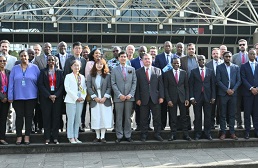The UN Economic Commission for Africa (ECA) convened a meeting with partners on 19 October 2023 in Addis Ababa, Ethiopia aimed at updating its partners on the strategic orientation of ECA’s work over the next three years.
The meeting also explored ways in which both parties could join forces to support Africa’s development priorities, as part of achieving sustainable development and structural transformation. Acting Executive Secretary, Mr. Antonio Pedro appreciated the ECA Partners for turning up in large numbers and thanked them for their continued partnership and collaboration with ECA. He noted that the last ECA Partners meeting was held 5 years ago, hence, it was necessary to bring back this engagement as part of ECA’s business model.
The meeting was an opportunity to share the ECA draft Business Plan to allow partners to contribute to its contents in advance of a proposed official launch in 2024. The Business Plan reflects intersections between shared strategic goals between the ECA and partners, which are also aligned with the interests of the African Union and the implementation of Agenda 2063.
Mr. Pedro highlighted some key messages emerging from a series of recent important meetings, including the Africa Climate Summit in Nairobi, and the SDGs Summit in New York. Common messages emerged from these meetings cantered on the opportunities and the need for urgent actions “to rescue the SDGs”. The SDG Summit in New York, held from 18-19 September 2023 launched a new phase of accelerating progress toward the Sustainable Development Goals (SDGs).
According to Mr. Pedro, “despite Africa facing strong headwinds to achieve SDGs and sustainable transformation in line with AU’s Agenda 2063, there are enormous opportunities, resources, and assets that are available in Africa, that can be leveraged to get back on track to achieve the 2030 Agenda for Sustainable development, Agenda 2063: The Africa We Want,” he said.
Explaining that draft ECA Business Plan presents Africa from the perspective of “being very conscious of the challenges facing Africa, it equally positions Africa as a region that can provide solutions to some of the problems that we are confronted with today. “Let us join hands and harness these opportunities”, he stressed.
Mr. Pedro informed the meeting that ECA was also focused on developing a school of thought and practice on among other key issues, sustainability transitions, achieving net zero target decarbonization agenda. “We are doing this through three tracks – macroeconomic and social policies for sustainable transitions; sustainable industrialization, trade, and economic diversification; and climate action and energy transitions,” he said.
He outlined that ECA’s approach as enshrined in its draft Business Plan is to combine vertical and horizontal approaches to ensure that we deliver in a seamless manner.
“Horizontal means delivering as one UN – bringing together what we represent as the United Nations in terms of analytical tools, processes, convening power in support to Member States and the African Union. While vertically, we will be ensuring these lines of support are delivered in a manner that produces impact at the country level through a collaboration with the UN country teams and the Resident Coordinators. It is about creating a transformational ecosystem where we move from our individual important projects and pilots to something that is more integrated,” he stressed.
For their part, the partners commended ECA for re-energizing the collaboration with non-African Member States based in Addis Ababa and underscored the need for more awareness on the work of ECA, including the support to the operations of the African Union and strengthening coordination and collaboration between the two institutions.
They stressed the need to create momentum for collaboration with partners at a technical level to maintain close cooperation going forward. Furthermore, they highlighted the need to boost ECA’s support at the country level specifically supporting the implementation of NDCs through financial support and technical support.
The partners also concurred on ECA’s continued support to countries in engaging on the international financial architecture and accessing climate finance. They stressed the importance of support to the AU as it takes up its seat at the G20 next year and increasing support to African countries and African governments on speaking out more in the international spaces on the international financial architecture reform.
They acknowledged the importance of strengthening collaboration and engagement with the UNRCs and noted the need to strengthen the Business Plan’s approach to critical issues such as good governance, agriculture, private sector engagement, value addition, and investments.

